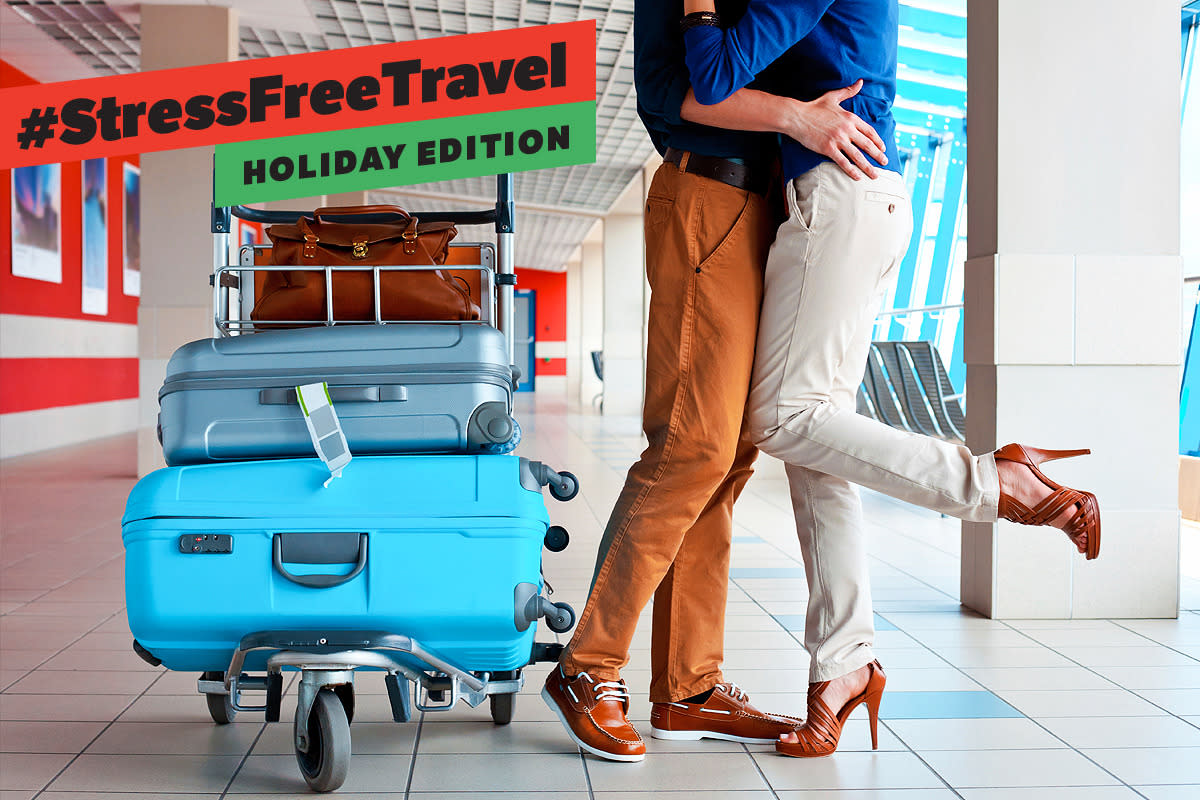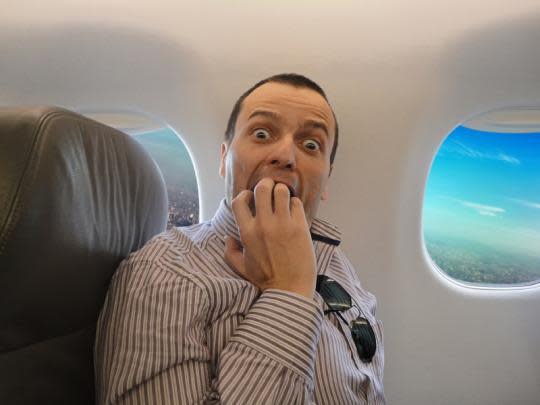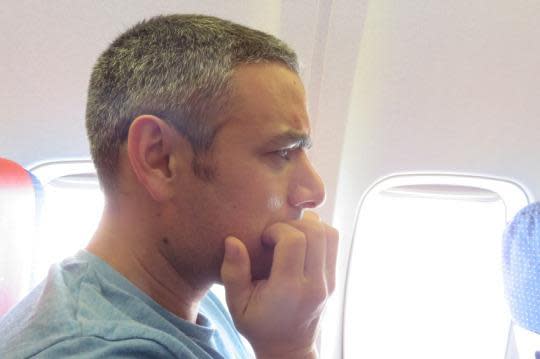The Best Way to Cure Your Fear of Flying

Some quality alone time before you fly could help calm your nerves during your flight. (Photo: Getty Images)
Could it be that the secret to getting over a crippling fear of flying is as simple as a night of good sex? According to a study, that just might be the case.
Veteran airline pilot-turned licensed therapist Tom Bunn is also a proponent of the sexy cure, thanks to anecdotal evidence and science.
“I had a male client who said he had a fear of flying for seven years,” says Bunn, who founded the SOAR program to help people with a fear of flying. “Every time he flew he was totally miserable, except for one time when, before he came back from a business trip, he hooked up with someone. He said they didn’t get any sleep. They made love all night long and he dragged himself out of bed onto the airplane and had a perfectly anxiety-free flight.”
Why is that? The passenger might have been too physically exhausted from the previous night’s activities (and the next day’s incessant smiling and strutting through the airport) to worry about being afraid of flying. But the answer might also have to do with science, specifically that new study Bunn says explains why certain people freak the heck out when they fly, especially when they encounter turbulence. He also thinks the study also explains how to cure that ailment — a cure that might just involve a little Sexy Time.

Yet another benefit to nookie… it could help you with your fear of flying. (Photo: iStock)
We’ll get to the sex part later, but first…
The philosophy behind this “curing-flying-fears-through-sex” theory can be found in the new study that has nothing to do with sex or flying. The study, by researchers at the Massachusetts Institute of Technology and published in Science Daily, explores why people who have experienced chronic stress throughout their lives are more susceptible to post-traumatic stress after a particular incident. It all has to do with memory consolidation — the process by which our brains process and record traumatic events.
“When something happens to you, if you don’t consolidate the memory, you don’t remember it,” Bunn says. “When some people get on a plane and have a turbulent flight, they forget about it [afterwards]. And it’s not that they try to forget about it. They just don’t consolidate that memory.”

Why do some people freak out over flights with turbulence? (Photo: iStock)
But the new research suggests that those who suffer from anxiety are expert consolidators. According to the MIT study, animals that underwent chronic stress prior to a traumatic experience consolidated bad experiences quicker and more thoroughly than non-stressed animals. Researchers say that’s because anxious brains become much more sensitive to serotonin, a chemical that helps etch memories onto the brain. The researchers says those quickly and vividly-implanted memories often lead to flashbacks, nightmares, and panic — key symptoms of post-traumatic stress.
Bunn says that’s absolutely true in airplane passengers. “Anybody who’s got anxiety in their lives when they get on a plane is more likely to produce post-traumatic stress,” he says.
Related: Why I’m Not Afraid to Fly
Nervous Flyers
Bunn says some people are anxious when they step on a plane simply because they hate flying. Other passengers are anxious because that’s how they are on non-travel days, too (maybe a childhood trauma has turned them into anxiety-ridden adults). Whatever the source of the passengers’ nerves, these people are prime candidates for a traumatic experience once they set foot on a plane.
“If a person is chronically anxious, it doesn’t take much serotonin for them to consolidate memory,” says Bunn. “It happens really fast.”

Research shows naturally anxious people process fearful memories much faster, and more permanently, than others. (Photo: iStock)
With such passengers encounter a bad flight, especially one with turbulence, Bunn says, their memory consolidation goes into overdrive. “What happens in turbulence [with anxious people] is enough stress hormones release that a person has trouble telling the difference between reality and imagination,” says Bunn. “So they start imagining the plane’s falling out of the sky. They really believe they’re about to die.”
The terror can linger long after the plane lands. “A bad flight that another person might forget about, they don’t forget about; it becomes carved in stone,” Bunn says. “And when, a week later, they think about getting on an airplane, they go right into a panic attack.”
How do you cure this? (And here’s where sex comes in.)

Thinking about sex can help suppress your fear of flying. (Photo: iStock)
Sure, there are drugs that can block the rapid-consolidation effects of serotonin (but not Prozac, which the MIT researchers warn may actually worsen symptoms by enhancing serotonin’s effects). But the big key to curing this type of post-traumatic stress, according to the MIT study, is preventing these traumatic memories from consolidating in the brain in the first place.
Bunn says your body can do that by producing another chemical: oxytocin, a hormone that plays a big role in sex and reproduction by bonding us to other humans. It also shuts down the part of the brain, the amygdala, where serotonin does its dirty work to help consolidate fearful memories.
Your body tends to produce oxytocin when: you’re a mother nursing a baby (so that anxieties and other concerns don’t cause you to stop nursing the baby); when we coo over a cute newborn baby (so that we feel compelled to protect and care for the baby so it can grow up and reproduce); and, here’s the important part, right before and right after you’ve had sex.

A hormone produced before and after sex tends to put us in a real calm mood. (Photo: iStock)
“Oxytocin is produced during foreplay when the chemistry is right between two people,” says Bunn. Think of dating a person you don’t expect to get physical with. Yet, when alone and really connected, you feel your defenses melting, and — to your surprise — realize, ‘It’s about to happen.’ That’s oxytocin shutting down the fear system.“
Related: Travelers Say They’d Give Up Sex to Get an Extra Day of Vacation
Bunn says oxytocin also plays a big role in the post-game show. “In sexual afterglow, there’s a bonding between the two people because nature knows that if you have two parents as a team taking care of the kid, the kid’s more likely to grow up and reproduce.”
Bunn believes oxytocin’s fear-suppressing ability was the key factor in his client’s post-coital, anxiety-free flight. “He was still producing oxytocin because of his intense, all-night experience,” Bunn theorizes. “Maybe he was still picking up her scent. But whatever it was, he produced oxytocin through the whole flight. He was fine.”

A pre-flight hook-up helped one of Bunn’s clients forget he didn’t like flying. (Photo: iStock)
Not that Bunn’s prescription for curing flight-related PTSD involves simply getting some action (then again, it certainly doesn’t hurt). Instead, Bunn works with clients — on the ground, well before they have to take a flight — to mentally link flying to an oxytocin-producing memory. Maybe they’ll picture their partners looking at them after they’ve made love. For new moms, Bunn might train them to think about nursing their babies. Either way, over time, Bunn says people can then be trained to link such memories with mental images of flying — the airplane doors closing, the plane taxiing down the runway, cruising through the air, and landing.
“You need to think about those things ahead of time so the links are established and it happens automatically when you’re on a plane,” Bunn says. “Once we find [what produces] oxytocin, we can just keep it going through the whole flight” — even one with turbulence.
It’s not sexy, but…
…Knowing that turbulence is relatively harmless helps, too. “For a pilot, it’s incomprehensible that anybody could fear turbulence because it’s just not a problem,” Bunn says, taking off his therapist hat and putting on his airline pilot hat. “The plane moves very little in turbulence; it’s built to handle what mother nature can dish out. Besides, [pilots] can look at the altimeter and see that the plane’s not falling out of the sky.”
In fact, the biggest danger turbulence poses isn’t to the airplane — it’s to anyone who’s not strapped in when turbulence hits. Such people account for the majority of turbulence-related injuries — a good reason to keep your seatbelt time whenever you’re seated or when the “fasten seatbelt” sign is on.

Seriously, stop worrying about turbulence. There are more fun thoughts to have. (Photo: iStock)
Plus, statistically, the period where you’re most likely to encounter turbulence — during the cruising portion of your flight — is by far the safest part of the flight. About 47 percent of fatal commercial plane accidents occur during final approach and landing, more than any other phase of the flight (ironically, that’s the time nervous flyers are most likely to relax, as their ordeal is almost over).
“For a fearful flyer, the time they are most afraid is the time that is safest,” says Bunn.
Related: Planes Can Avoid Turbulence With New Technology
Sex doesn’t solve everything
Bunn admits: “In my work with fearful fliers now, I can’t depend on them being able to bring to mind a lovemaking experience so powerful that simply thinking about it will carry them successfully through a flight."
Still, he says linking sexual memories, even ones that aren’t so powerful, to thoughts of flying can have tremendous effect. If you suffer from debilitating fears of flying, and/or freak out during turbulence, it might be worth a try. Plus, when compared to other fear-reducing techniques like talk therapy or hypnosis, thinking of a night of good sex is a heck of a lot more fun.
WATCH: A Broad Abroad: Americana Rules! Inside The Best Little Carnie Museum In Louisiana
Let Yahoo Travel inspire you every day. Hang out with us onFacebook,Twitter, Instagram, and Pinterest. Check out our original adventure travel series, “A Broad Abroad.”

